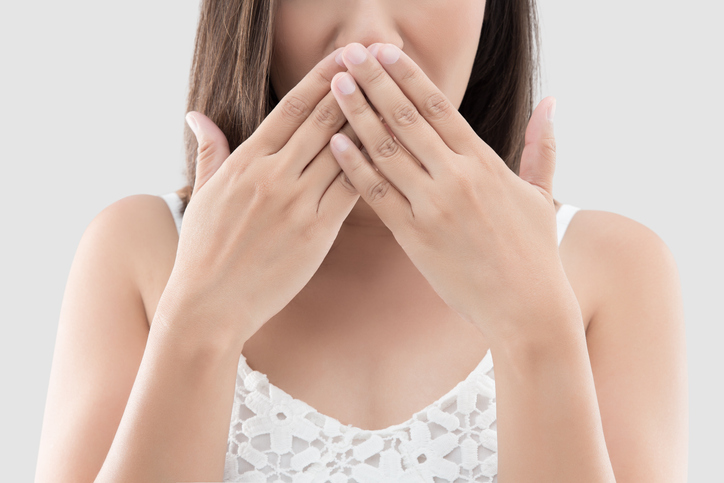How to Overcome Halitosis

Few things are more embarrassing than having bad breath, and yet if you struggle with halitosis, you’re not alone. About 25-30 percent of the world’s population suffers from chronic halitosis, from a variety of causes. It can be the result of a medical condition like diabetes, sinusitis, or intestinal disorders, or it could happen because of malnutrition or dry mouth, but most of the time the problem originates with the gums, teeth, and tongue. What can you do about it? It all begins with better habits.
- Clean your teeth more thoroughly. Spend two to three minutes at least twice a day, brushing each tooth to remove plaque, the sticky buildup on your teeth that collects bacteria and causes bad breath. It’s extremely important that you brush your teeth before going to bed, and you might consider a second round of tooth brushing with baking soda, to reduce your mouth’s acidity. Floss at least once a day, to get the food debris your toothbrush can’t reach. Have dentures? Remove them each night and clean them to remove bacterial buildup.
- Don’t forget your tongue. The coating on your tongue can harbor smelly bacteria, but brushing your tongue when you brush your teeth can get rid of it. If brushing your tongue with your toothbrush is uncomfortable, try a tongue scraper. These tools, available at your local drug store, are specifically designed for cleaning the surface of the tongue, removing bacteria, dead cells, and food debris.
- Give it all a rinse. Using a mouthwash designed to kill bacteria and not just mask odors can help solve your problem. Swishing with plain water after you eat can also help your breath by removing food particles from your mouth, and research indicates that if you rinse your mouth with black or green tea you’ll suppress the growth of halitosis-causing bacteria.
- Keep your body hydrated and your mouth moist. Drinking at least six to eight 8-ounce glasses of water each day can help you avoid dry mouth, and chewing sugarless gum or sucking on sugarless candy can stimulate the flow of saliva.
- Eat the right kinds of food. If you’re going to be around people, don’t eat foods like onion and garlic that can sour your breath. Do snack on crispy fresh fruits and vegetables, which can boost your saliva flow and help clean your teeth. You can also chew on cloves, fennel seeds or aniseeds, fresh parsley, basil, mint, or cilantro, or even a piece of orange or lemon rind. All of these things can help freshen your breath by discouraging the growth of bacteria, neutralizing odors, and stimulating saliva production.
- Don’t smoke. Smoking makes your breath smell bad, but it also damages your gums, which can make your breath even worse. Protect yourself from gum disease and oral cancers by avoiding tobacco entirely.
- Be mindful of your gums. If you’ve got unhealthy gums, bacteria can accumulate in pockets at the base of your teeth, leading to bad breath. Gently brush around the gum line when you brush your teeth, to help your gums stay healthy, but see a dentist regularly to make sure to keep them that way.
- Your dentist can help keep your breath good and your teeth healthy. Visit your dentist regularly, and make sure to address any concerns you might have about your breath. Your dentist will be able to rule out any dental problems and help you find the solution to your problem, and can refer you to your medical doctor if the issue appears to be systemic.
At Glenwood Premier Dental, we believe that a healthy, confident smile is an important part of a happy and healthy lifestyle. Our staff of caring professionals is committed to offering a wide range of dental services, exceeding our patients’ expectations, and providing the best possible service. We offer dental exams and teeth cleanings, implant dentistry, Invisalign, laser dentistry, teeth whitening, veneers, and more, using state of the art technology in a comfortable and friendly environment. If you’re looking for dental care in Hazlet, contact us through our website or call 732.264.4477 for more information.
